Once again (hopefully for the last time) I’m writing a thread about the “Navalny Card,” about Ashurkov’s “affidavit,” and how bankers use Vladislav Solodkiy’s story.
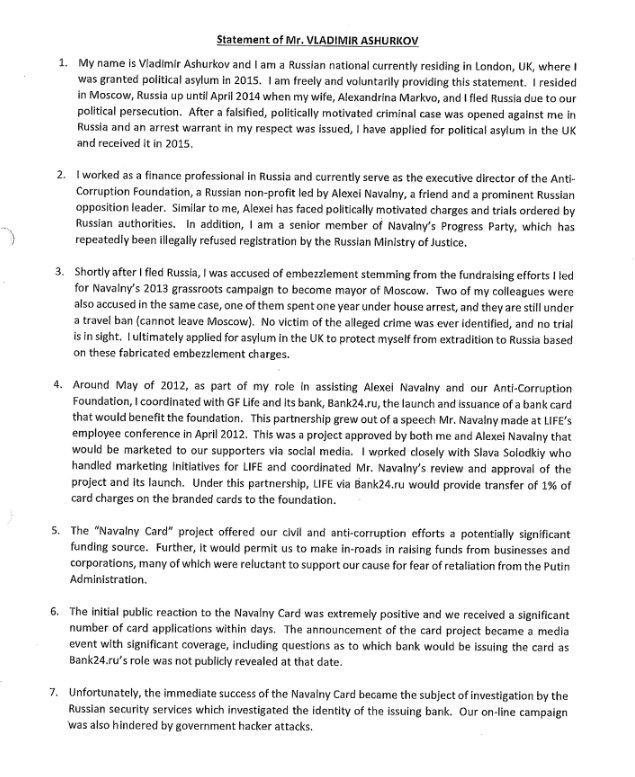
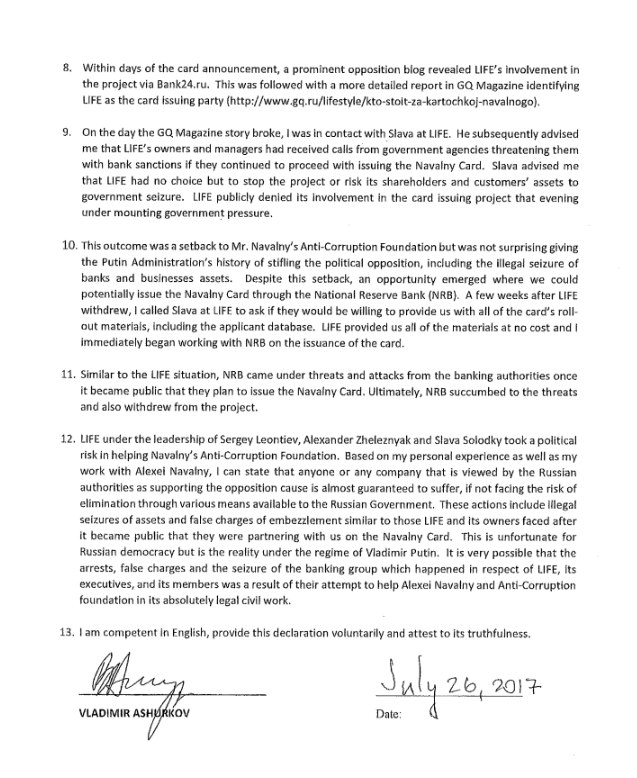
The first three points of the document are a setup to make the reader ascribe weight to the author of the written testimony — Ashurkov. And then the inconsistencies begin…
I should note right away that there was not a single word about Solodkiy in Katz’s investigation for one simple reason: of all those in leadership roles, he was the only real — albeit passive — supporter of Navalny.
I went through all of Solodkiy’s Instagram and Facebook. I found exactly six opposition posts. Mostly from Navalny’s 2013 mayoral campaign, plus one in 2012. There was also one post about the “Navalny card” from June 30, 2012, in the print edition of Forbes.
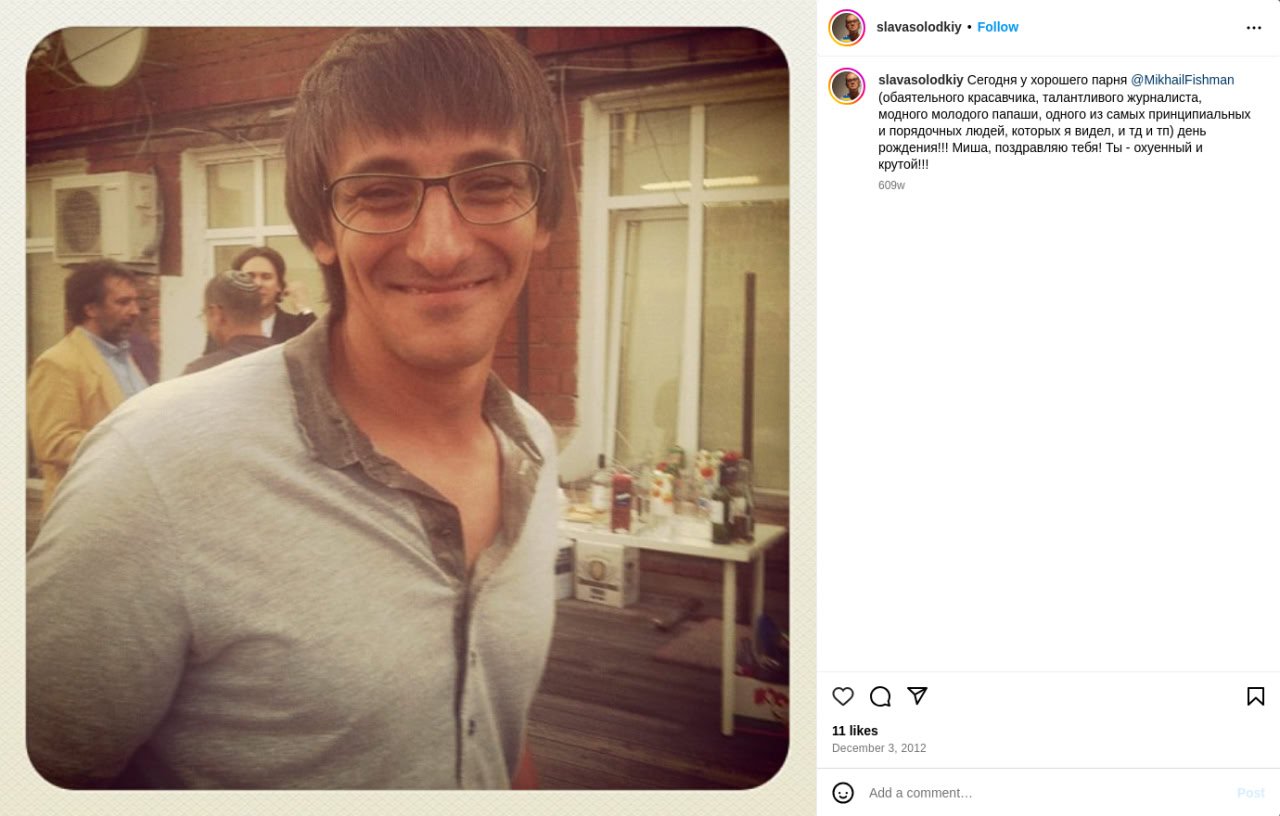
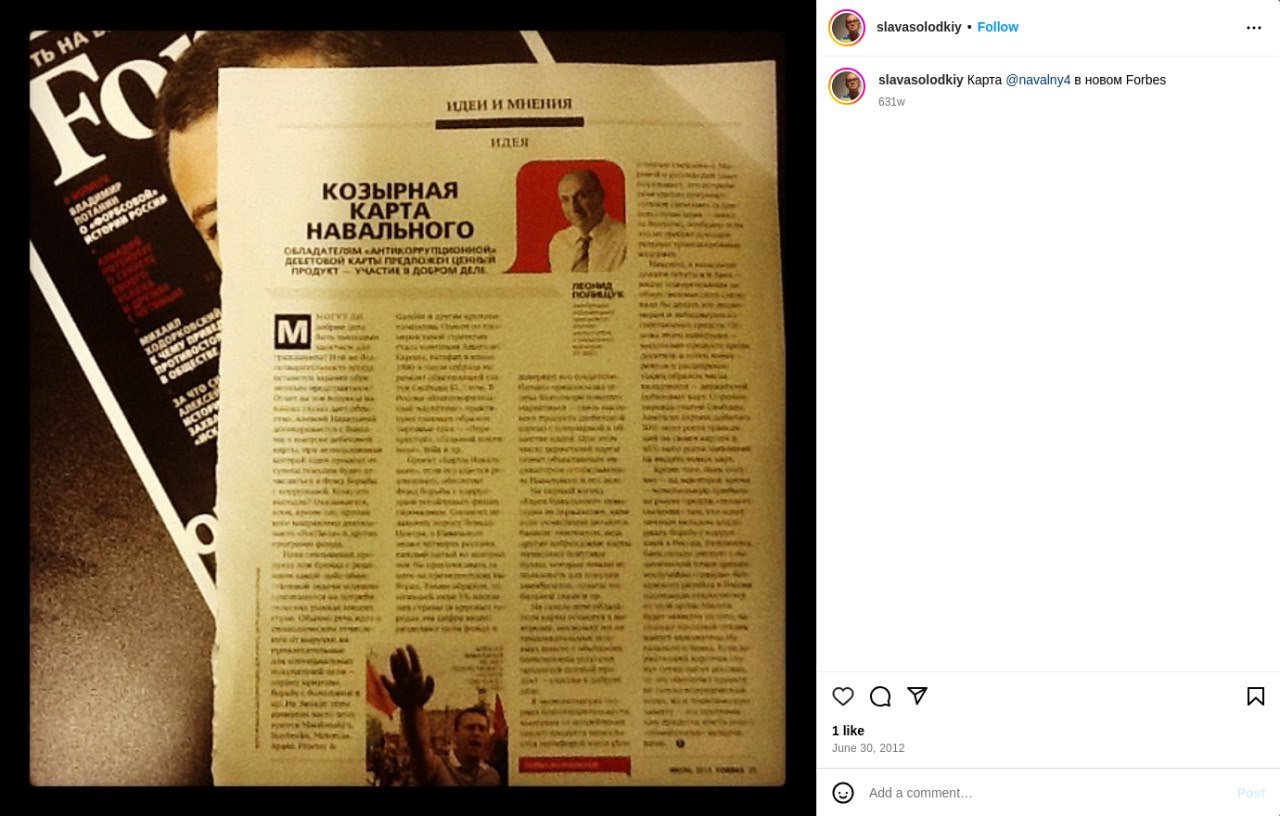
I found no signs of active contacts with Zheleznyak and Leontyev, aside from corporate gatherings and birthdays within the Probusinessbank circle, or business meetings that Oleg Tinkov would later call “fraud.” As head of the Life.Sreda venture fund, he traveled the world and exchanged experience with various banks.
Ashurkov really did participate in the financial side and may even have had contacts with some other banks. However, according to Vyacheslav Solodkiy, the idea of the card did not come from the management, but from him personally.
Courtney Weaver FT
Slava Solodkiy was, at the time, ProBusinessBank’s marketing guru, and a big fan of Navalny. And he took part in the protests.
Slava Solodkiy FT
Back then I just wrote to … I remember it was some rather silly email like [email protected] or something like that. He replied: “Okay. Cool that I’m interesting to guys like you. Let’s meet.”
Courtney Weaver FT
Navalny comes and gives a speech on corruption in Russian business and why it’s bad for the country’s economy. It’s not as political as some of his later speeches, but he’s well received. And later, Navalny and the bank start thinking about how to work together.
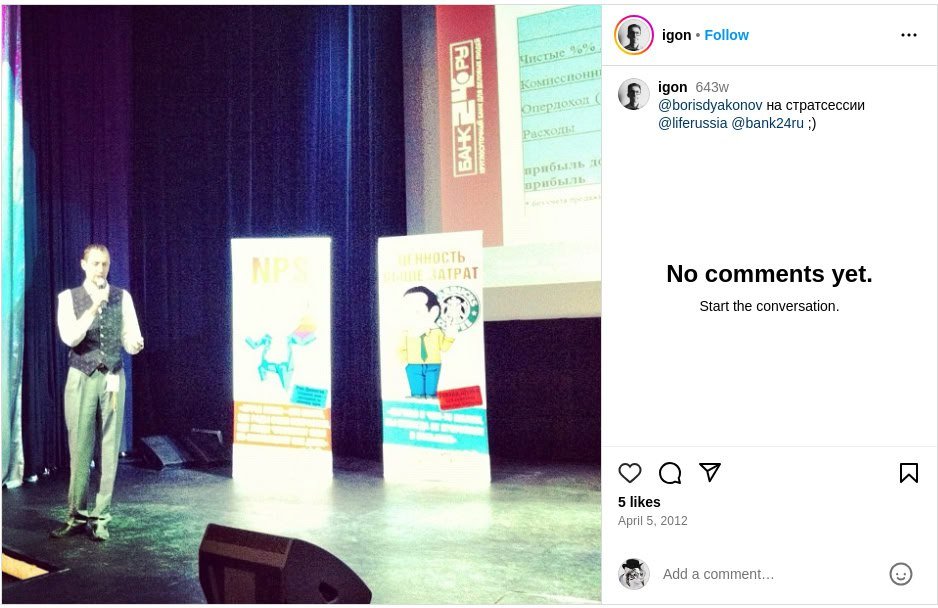
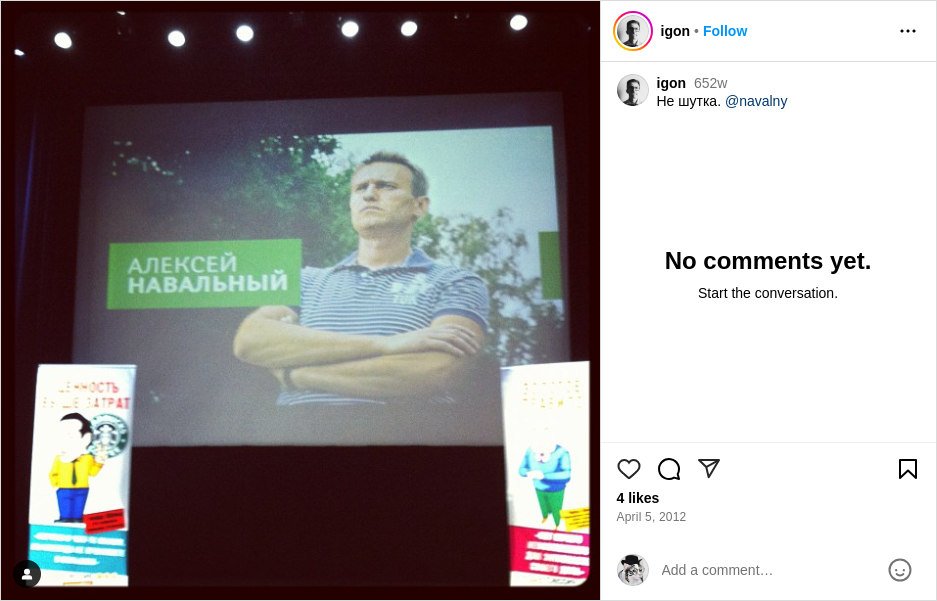
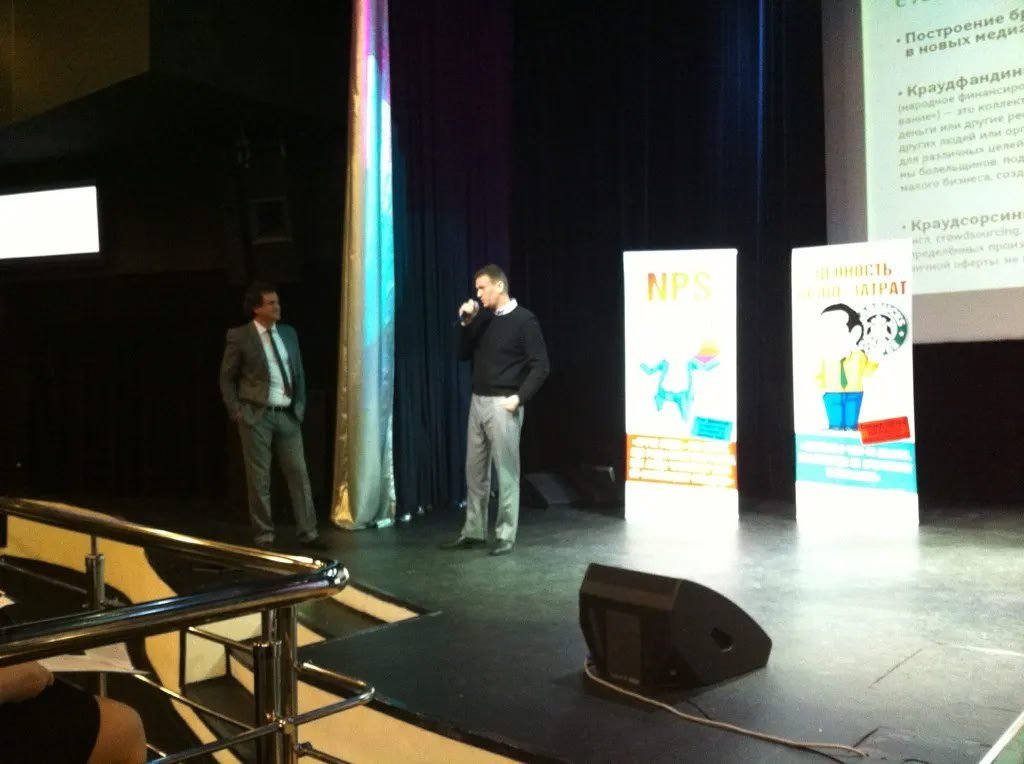
Navalny speaks at a regular strategy session of Bank24 at the Borodino Plaza business center.
Slava Solodkiy FT
I thought, why not launch a Navalny card.
Courtney Weaver FT
Slava had an idea. He thought that many cards return cashback. What if that money actually goes to Navalny’s Anti-Corruption Foundation? So that people feel they’re doing something good with their money.
Slava Solodkiy FT
You can use that 1 percent from each purchase to donate to Navalny’s campaign.
Courtney Weaver FT
They prepared marketing materials. Materials emphasizing Navalny’s activity in anti-government protests, mostly showing that there is a desire for change in Russia.

In his written testimony, Ashurkov writes that he coordinated the creation and issuance of the bank card. That the partnership resulted from Navalny’s speech at the LIFE employees’ conference in April 2012. He further writes that the project was approved by him and Alexei Navalny.
Ashurkov’s affidavit
I worked closely with Slava Solodkiy, who was responsible for LIFE’s marketing initiatives, and I coordinated the review and approval of the project and its launch with Mr. Navalny. As part of this partnership, it was envisaged that LIFE, through Bank24, would transfer 1% of the amount of payments on the branded cards to the fund.
The “Navalny Card” project promised a potentially significant source of funding for our civic and anti-corruption efforts. Moreover, it would have enabled us to succeed in raising funds from businesses and corporations, many of which did not want to support our cause for fear of persecution by the Putin administration.
Now we record the discrepancies.
Ashurkov’s written testimony
The first public reaction to the “Navalny Card” was extremely positive, and within a few days we received a significant number of applications. The announcement of the card project became a media event that received wide coverage, including questions about which bank would issue the card, since Bank24’s role had not yet been publicly disclosed. Unfortunately, the instant success of the “Navalny Card” attracted the attention of the Russian security services, who discovered the identity of the issuing bank. Our online campaign was also hampered by government hacker attacks.
Ashurkov’s Facebook post
The project received a great public response. During the preparation of this project, Alexei Navalny and I got acquainted with the main owner of the group, Sergei Leontyev, and several managers. A few days before the project presentation, when the group’s participation was about to become public, one of the bank’s managers contacted me and said that representatives of the security services, having learned about the bank’s participation in the project, pressured its shareholders and forced them to withdraw.
Ashurkov’s interview to Dozhd
In a conversation with the TV channel Dozhd, Vladimir Ashurkov, head of Navalny’s fund, said the fund and the bank came up with the idea jointly.
Courtney Weaver FT
Navalny begins to advertise this card on social networks, but does not disclose the bank’s name.
Slava Solodkiy FT
We thought it was risky, but possible, because there were surely a lot of protesters. The police would come, people disappeared, but at the time there weren’t that many arrests. These weren’t such hard times to actively protest against Putin or anyone else. Sort of risky, but manageable risk.
Courtney Weaver FT
Then the whole thing starts to get a bad reputation. It turns out that Sergei’s bank is behind the card. And the reaction of the Russian authorities is not very positive. Sergei’s business partner says he starts getting calls from people with government connections. The message is pretty simple: shut it down. Very soon after that, Sergei and his business partner decide to fold it.
In Solodkiy’s deleted Linkedin article and in a still-available Medium article, the phrase “very soon” links to an article dated October 7, 2012.
The article reads:
“The bank decided to drop the project,” said Vladimir Ashurkov, head of Navalny’s Anti-Corruption Foundation, without specifying the bank’s name. “As far as I understand, they got scared of the political risks.”
“The co-branded card, which was supposed to become the latest accessory of anti-Putin protesters, was scheduled to launch earlier this year, but was postponed indefinitely.”
“We have been in talks with several other banks, but at this point there are no concrete plans,” Ashurkov said Friday.
“The idea was not originally Navalny’s, but was proposed by the bank that has now dropped the project,” Ashurkov added. The Anti-Corruption Foundation declined to comment on the identity of the institution that proposed the scheme, saying only that it is one of the country’s 100 largest banks.
“But billionaire Aleksandr Lebedev said in a July interview with Izvestia that his National Reserve Bank, ranked 98th in the country by assets according to Allbanks, was in talks to issue the card.”
“Pressure on Lebedev, who also holds stakes in agriculture, construction and the media industry, appears to be mounting, and last month he said he was going to scale back his business in Russia.”
“Nevertheless, the National Reserve Bank is still keen to issue the ‘Navalny card,’ Lebedev’s spokesman Artem Artemov said Friday.”
“He said the bank has many projects, and this is one of them. It’s in development.”
Presentation
The claim of 5,000 applications is asserted solely by Solodkiy himself in the cited articles and in a presentation which shows that by the evening of the announcement and initial collection of applications it was still a creative marketing idea that needed to be sold to bank leadership (otherwise why present projections to management). The Russian promo video on YouTube was posted on May 16, 2012, per the web archive, but later deleted. The English-language promo was uploaded on May 13, 2012 and is still available.
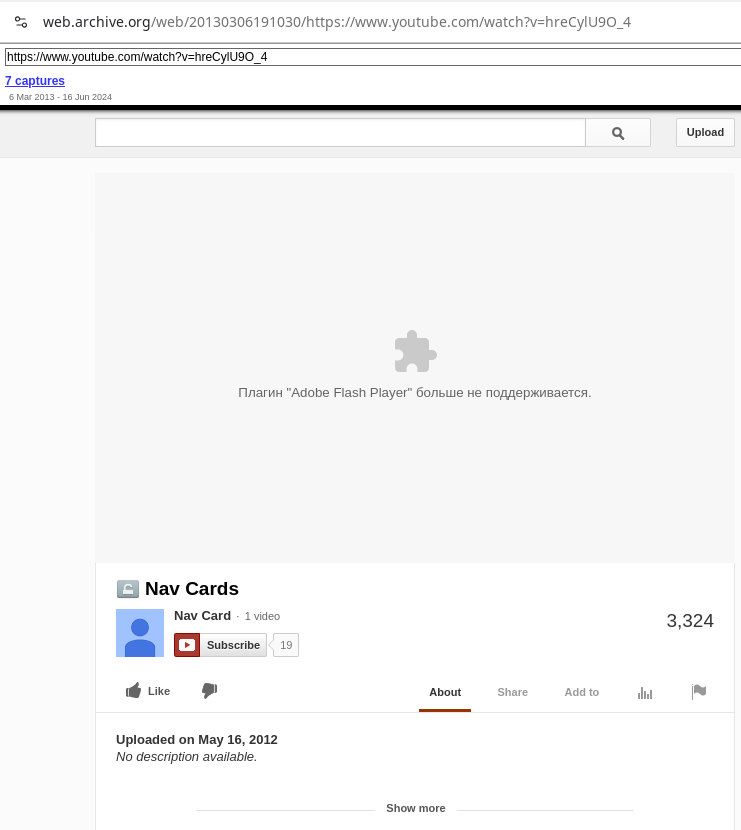
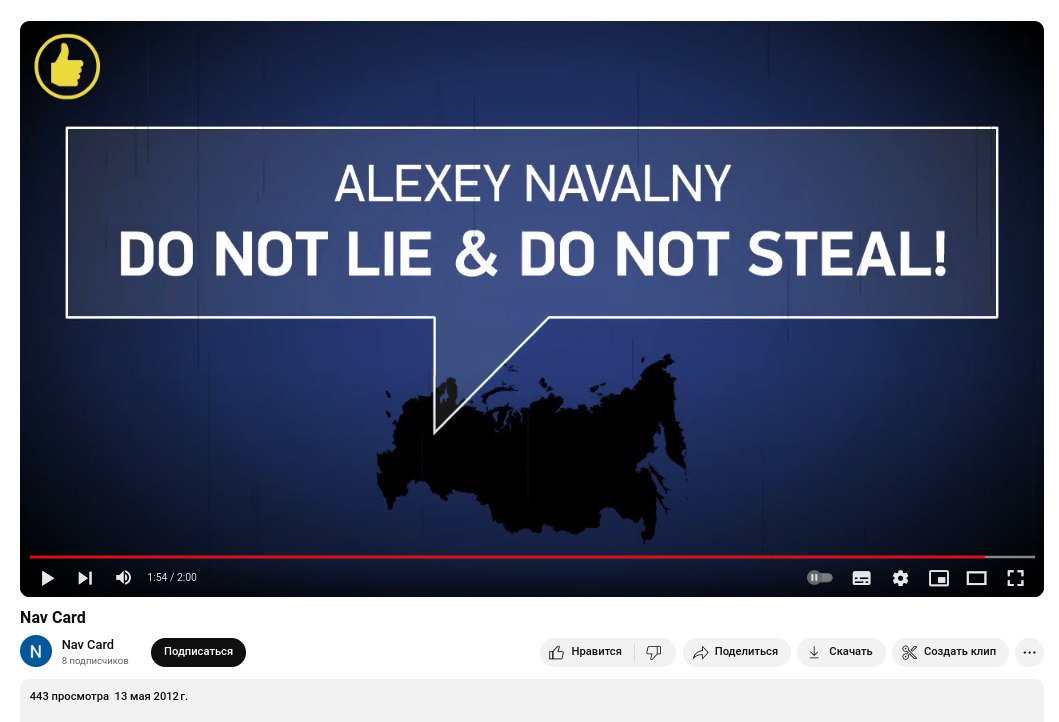
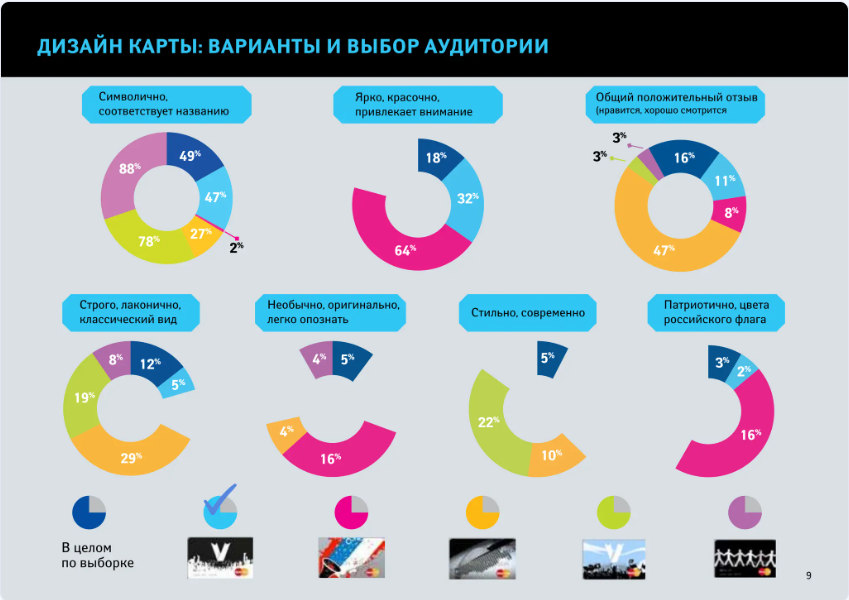
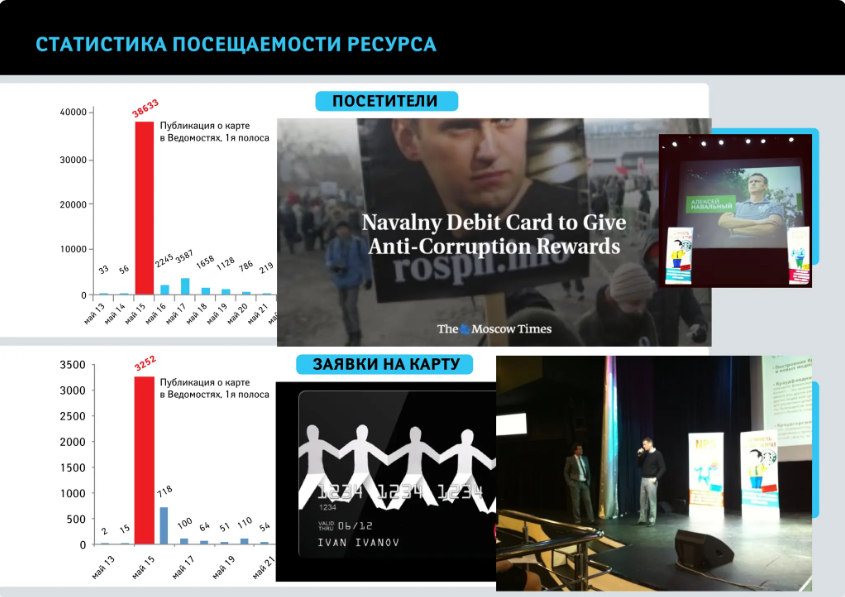
And at 20:21, on the launch day, May 15, 2012, the following note appears in GQ:
Vladislav Solodkiy, VP for advertising and PR of the LIFE Financial Group, sent the GQ editorial office an official written denial of the group’s involvement in the “Navalny Card.” “We had and have nothing to do with this project,” Vladislav stated.
Also, the GQ article states:
According to information obtained by GQ Political Blog from reliable sources, the card will be issued by one of the banks in the LIFE Financial Group, which includes the head “Probiznesbank” and six subsidiaries. Anton Shubyenkin, head of Probusinessbank’s press service, refused to confirm this information, but noted that the seven banks within the group have “horizontal rather than vertical subordination.” The initiative, according to our sources, comes from the group itself, which saw the “Navalny Card” as a good way to attract a new audience and which itself reached out to the politician. (According to an eyewitness, Navalny spoke about this project at his lecture at the Russian Economic School, where he casually mentioned the idea of a card.) Also, according to our source, “some of the group’s co-owners hardly know about this project.”
From E. V. Panteleev’s survey
There was never any known active political stance by Leontyev S.L. Navalny A.A. was once invited to a corporate event “Strategic Session” as a public figure. The idea of a co-branded card with a portion of the bank’s commission going to the Anti-Corruption Foundation was not Leontyev’s idea and was rejected by me personally, as it was non-core for the bank and it is unacceptable to support political views of any orientation, since that contradicts the interests of clients and shareholders, who are only interested in profitability. In my view, politics should have nothing to do with a bank.
Sergei Leontiev FT
We received a message that we would be punished because of Navalny. Because I supported the opposition. This was a clear message. But that’s my problem. I just act the way I think.
Stefania Palma FT
On the one hand, it’s true that Sergei did approve the Navalny card projects. But does that mean we should believe this was the key reason the Russian regime began to persecute him, and that’s why he lost the banking license?
Courtney Weaver FT
If we recall, when Sergei was still in Russia, he did not attend those anti-government protests that Slava went to. He didn’t give money to Navalny’s organization when he was there. And when we talked to a senior member of Navalny’s organization, he hadn’t even heard of Sergei. At the same time, Sergei keeps telling us he is convinced this is why he is persecuted.
Sergei Leontiev FT
It’s just the narrative of all of the different theories and narratives, which is consistent with reality. (untranslatable mumbling)
Courtney Weaver FT
As in many cases in Russia, it’s hard to say whether Sergei and the bank were attacked because of the “Navalny Card.” But in his asylum statement Sergei ties his fate to Navalny’s, writing: “Navalny has been repeatedly arrested and convicted for the same baseless financial crimes that the Russian authorities accuse me of.”
Ivan, the head of a central bank who met with Petr, claims Navalny has nothing to do with the raids.
Ivan, voiced by an FT actor
The Central Bank knew nothing about Navalny or his involvement. Even if we knew about it now, it wouldn’t change anything. Nothing at all. The victims here are clearly the depositors and owners. They simply took depositors’ money and have lived on it for 10 years.
Courtney Weaver FT
But this is Russia and Vladimir Putin. Kyle Parker, a Congressional staffer who studied Sergei’s case, says he has seen this before.
Kyle Parker FT
I had to revise my view of just how thin-skinned and petty some Russian officials can be. Where I thought: “Surely they won’t persecute this person. Surely this is too small a matter…” And no, it’s not that small. And they do persecute him.
The Twitter buzz about the card was on May 16 in the accounts of Tinkov and KermlinRussia. Screenshots of those tweets are cited by Solodkiy himself in the Medium article. My speculation is that Ashurkov’s later written references to a “famous blog” relate to those tweets, because there are simply no other mentions anywhere.
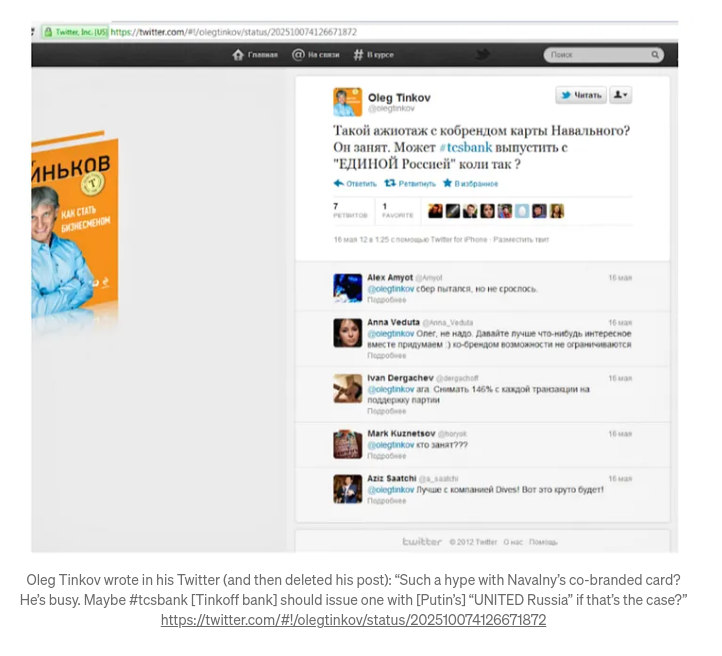
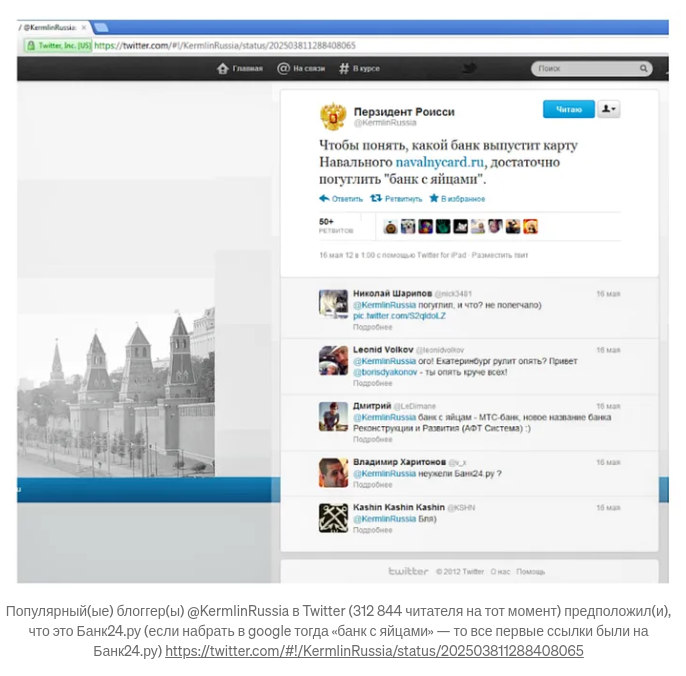
Ashurkov’s affidavit:
Within a few days after the card’s announcement, one of the well-known opposition blogs revealed LIFE’s involvement via the Bank24 website. Then a more detailed report followed in GQ, which named LIFE as the party issuing the card.
On the day the GQ Magazine article was published, I spoke with Slava at LIFE. Subsequently, he told me that LIFE’s owners and managers received calls from state bodies threatening them with banking sanctions if they continued to issue the Navalny card. Slava told me that LIFE had no choice but to stop the project or risk having the assets of its shareholders and clients seized by the state. That same evening, under increasing government pressure, LIFE publicly denied its participation in the project.
I emphasize, we are still talking about the same day.
This outcome was a failure for Mr. Navalny’s Anti-Corruption Foundation, but unsurprising given the history of the Putin administration’s suppression of political opposition, including unlawful seizure of bank and corporate assets. Despite this setback, an opportunity arose to issue the Navalny card through the National Reserve Bank (NRB). A few weeks after LIFE withdrew, I called Slava at LIFE and asked if he was ready to provide us with all the card issuance materials, including the applicant database. LIFE provided us with all the materials for free, and I immediately began working with NRB on issuing the card.
It is important to note that the site content did not change until September 2012, and in June the outlet Slon published:
Nevertheless, other bankers interviewed by Slon claim there are no serious political risks, except perhaps increased scrutiny from inspectors, generally speaking for a bank (see the full survey). This is partly confirmed by Alfa-Bank’s consent to become the settlement bank for the Navalny Anti-Corruption Foundation. The previous donation method via Yandex.Money will remain, but now Navalny proposes channeling donations through this bank.
But on the day of the official project announcement, May 15, Alexander Zheleznyak, chairman of the board of Probusinessbank, denied the existence of a joint project.
“I only know that there is such a person as Navalny, and nothing more. Perhaps at the executor level he talked to someone about issuing cards, but as the first person I know nothing about it. I would have known had it reached that stage of discussion and there was a project,” he told Slon. Despite the lack of reliable confirmation, information about the partnership leaked to the media and was published by GQ. After that, the bank issued an official denial, stating that this information was not only untrue but also caused reputational harm to the financial group. Thus, the group’s shareholders did not want to link its banks to political projects. The Probusinessbank website states it develops independently of political parties and movements.
Alexander Lebedev, chairman of the board of the National Reserve Corporation:
— We expressed interest in issuing co-branded cards via the National Reserve Bank, but I don’t have a formal proposal yet. We discussed the situation in principle: I was preliminarily asked how I would feel about it, and I asked to see how well it was worked out. If these cards help popularize the fight against corruption, it would be good for civil society. As I understand it, the project was originally done with another bank, and then something stalled. I see no political risks, since supporting Navalny’s foundation is support for Putin’s and Medvedev’s efforts to fight corruption.
Bella Zlatkis, deputy chair of Sberbank:
— I am looking at the financial risks so far. It’s all unclear — unclear what the technology is; unclear what the proposal is. There could be questions about this activity, including risks and even the legality of transactions on these cards. For now it’s unclear to me. But this was only a statement so far. We haven’t heard the technology. As for political risks, if the political movement to which deductions are made is legitimate, then there should be no risks.
Oleg Vyugin, chairman of MDM Bank:
— I think that a bank that undertakes to issue cards with Alexei Navalny will not face political risks. Checks are possible on that basis, but the scale of the problem for the authorities is not that large. Well, a card is a card — what of it?
Ashurkov’s affidavit:
As with LIFE, NRB faced threats and attacks from the banking authorities as soon as it became known they planned to issue the Navalny card. As a result, NRB succumbed to threats and also left the project.
I repeat the October 7, 2012 quote from the piece cited by Solodkiy:
Nevertheless, the National Reserve Bank is still seeking to issue the “Navalny card,” Lebedev’s spokesman Artem Artemov said Friday.
Ashurkov’s affidavit:
LIFE under Sergei Leontyev, Alexander Zheleznyak and Slava Solodkiy took a political risk by helping Navalny’s Anti-Corruption Foundation. Based on my personal experience and work with Alexei Navalny, I can assert that any person or company that the Russian authorities deem supportive of the opposition is almost guaranteed to suffer or even face destruction via various means available to the Russian government. These actions include illegal seizure of assets and false embezzlement charges, similar to those faced by LIFE and its owners after their cooperation with us on the “Navalny Card” became known. This is regrettable for Russian democracy, but it is the reality under Vladimir Putin’s regime. It is quite possible that the arrests, false accusations and expropriation of the banking group that happened to LIFE, its managers and members resulted from their attempt to help Alexei Navalny and the Anti-Corruption Foundation in their entirely lawful civic activity.
I will conclude by quoting Ashurkov’s own Facebook post:
The scenario that the group’s bankruptcy and the persecution of its shareholders and management were a direct consequence of the failed “Navalny card” project is possible, but seems to me rather unlikely. <…> It seems likely to me that the LIFE group’s banks ended up on the list of banks subject to such a procedure. And because their shareholders were considered “politically unreliable” (because of the attempt to issue “Navalny cards” and, in general, their opposition views) their folder in the stack of folders of banks slated for such state raiding moved to one of the top places.
For the record, Ashurkov writes:
Since none of the leadership team lived in the US, we needed to bring in an experienced person to help us with the administrative and financial matters of registering and operating the American legal entity.
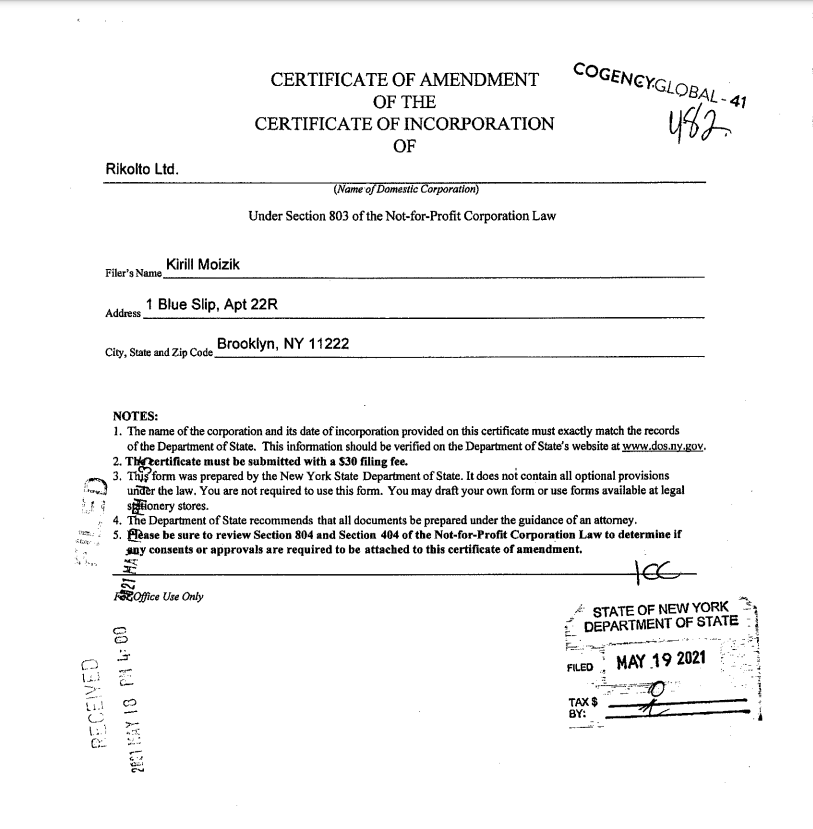

Kirill Moizik, apparently a US citizen, on the very day when all the other paperwork transferring control to Zheleznyak was executed, was the owner of ACF Int for several hours. That was September 8, 2021. According to RT and Remeslo, donations were collected to his PayPal. You can omit this part due to the RT source; it doesn’t change the essence much, since the hacked Navalny correspondence shows clearly that FBK has a specialist for setting up companies outside Russia.

In YouTube videos, FBK staff claim Zheleznyak had been holding rallies for many years, but his activism began only a few months after Navalny’s poisoning.
Don’t lie and don’t steal foundation — ptooey!
And for the most patient, a few details you can interpret as you wish:

- Leontyev was cited as a shareholder in Life.Sreda’s Instagram in 2013.
- Leontyev has a US legal entity registered with that name.
- Solodkiy launched several investment bubbles that quietly vanished, including crypto.
- Public sources suggest around $150M flowed from Probusinessbank to Life.Sreda before license revocation. Yet no one from that VC company was brought to subsidiary liability.
- Life.Sreda appears in the Panama Papers (they are Trident Trust clients).
- Slava’s personal Twitter account was renamed to nansen.id.
- And a joint photo with Shuvalov in 2016:
There was Solodkiy, who worked on factoring. He is constantly looking for some crap to invest in. Every other project of his is a bubble with varying “success.” And he invited Navalny to the strategy session on April 5. On April 24 at 22:50 Navalny posted on Twitter something like “we’ll do the card,” and then quickly deleted it. There are three public photos from that April 5 meeting. It’s a regular strategy session on potential new projects they were always cooking up.
By the way, here’s Solodkiy in November 2016 with Shuvalov in Singapore. A true oppositionist.

Life.Sreda, by the way, is Leontyev’s US legal entity.
I previously wrote about Ashurkov’s lie